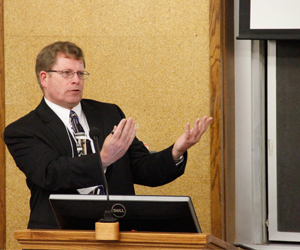Book of Psalms May Have Influenced Psalm of Nephi
Contributed By By Marianne Holman

BYU professor Kenneth L. Alford speaks at the Sperry Symposium at Brigham Young University.
Article Highlights
- An old Jewish tradition involves mourning the death of a person by singing the Psalms.
- Nephi records the death of his father just verses before he begins the psalm of Nephi.
- Specific wordings, topics, and passages show distinct similarities between Psalms 25–31 and the psalm of Nephi.
“We know that the Psalms played a really important part in religious worship among ancient Israel.”—D. Bryce Baker, Sydney B. Sperry Symposium
Related Links
PROVO, UTAH — The writings of Nephi suggest that he was influenced by the writings found in Psalms in the Old Testament, scholars said during the 42nd annual Sidney B. Sperry Symposium, held at Brigham Young University on October 26.
Joining forces to discuss the topic, BYU professor Kenneth L. Alford and D. Bryce Baker, a senior adviser in the U.S. Office of Personnel Management, shared parallels between Psalms 25–31 and the psalm of Nephi as found in the Book of Mormon.
What has also been called “a song of Nephi” and “a thanksgiving hymn,” the account of Nephi found in 2 Nephi 4 suggests that he had access to the Old Testament and found strength from reading the words of the ancient prophets.
Specifically looking at Nephi’s life at the time of the account, Brother Alford said, “Put yourself in Nephi’s situation. In verse 12, that is where Lehi is recorded as having passed away. … Think of all the responsibilities [Nephi] now has—Nephi is a father, a husband, maybe a grandfather at this time, but … now, with the death of Lehi, he has become the Church leader, the prophet.”
Nephi depended a lot on his father for instruction, help, and guidance. He listened to what Lehi taught and followed Lehi’s counsel. Because he was mourning the loss of his father and realizing the new responsibility he had, in addition to persecution from his brothers, Nephi was experiencing a rough period of his life.
For many centuries, Jewish tradition follows that when someone passes away the families would often get together and sing, sit, share experiences, and read from the book of Psalms for at least 24 hours as they mourned their family member who had left them behind, Brother Alford taught. Still today, funerals of many faiths oftentimes include Psalm 23.
“So if you were in Nephi’s position, where would you turn?” he asked. “What would you do and where would you go? As a Latter-day Saint you would probably turn to the scriptures, and we are going to contend that that is exactly what he did. Nephi would have turned to the plates of brass.”
Many references to the plates of brass in the Book of Mormon show they contain “the doings of the Lord in other lands, among people of old.”
“We know that the Psalms played a really important part in religious worship among ancient Israel,” said Brother Baker.

D. Bryce Baker compares Nephi's psalm found in the Book of Mormon with the book of Psalms in the Old Testament during the 42nd annual Sperry Symposium. Photo by Marianne Holman.
In 2 Nephi 4:15, Nephi said he recorded “the things of my soul, and many of the scriptures which are engraven upon the plates of brass.” He continued by saying that his “soul delighteth in the scriptures, and my heart pondereth them, and writeth them for the learning and the profit of my children.”
Although references to Psalms are found throughout all books of scripture, there are distinct similarities that exist between Psalms 25–31 and the psalm of Nephi, the presenters pointed out.
The psalm of Nephi suggests that at that time Nephi was influenced by reading from the book of Psalms and included similar verbiage. Wording such as “pure hearts and clean hands,” his mention of a “fall into the pit which they digged,” and the phrase “goodness of the Lord” are specific to these passages of scripture. Other phrases—including “God’s mercy,” “praise thee forever,” and “rock of my salvation”—are a few of the many similarities that show the influence of the book of Psalms on Nephi’s writing.
In the small sample discussed by Brother Baker and Brother Alford, there are at least 19 different topical connections to Nephi’s psalm found in Psalms 25–31, and more than 60 passages link the two together.
